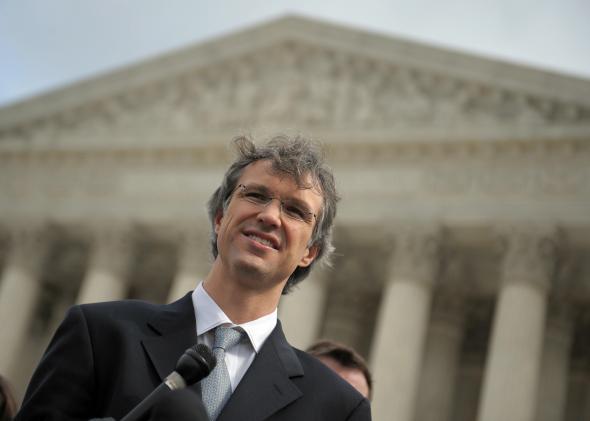We’re little more than a month away from marriage equality oral arguments at the Supreme Court—but one major question still looms: Who’s going to argue this thing? Solicitor General Donald B. Verrilli Jr. will probably get a few minutes before the justices to explain why the federal government favors same-sex marriage. But the motley legal crew supporting this litigation has yet to settle on an advocate to represent the cause of marriage equality before the bench. Every attorney involved undoubtedly has the chops to argue for equal dignity with precision and panache. But one clearly stands above the rest, and deserves to carry this case across the finish line: Jeffrey L. Fisher.
Although he’s not a household name (yet), Fisher has occupied the top tier of legal superstardom for at least a decade. A Stanford law professor and frequent Supreme Court litigator, Fisher led the successful crusade to reestablish the confrontation clause as a vital tool for criminal defendants. Before this effort, prosecutors across the country could introduce out-of-court testimony at a defendant’s trial without giving the defendant a chance to confront the witness and cross-examine his testimony. In a series of cases argued by Fisher, the court curbed this disturbing practice, holding that defendants must be allowed to confront any witness whose testimony is used against him.
Support for the confrontation clause cuts across political ideology, meaning Fisher’s role in restoring the clause’s vigor did not afflict him with an aura of partisanship. (Justice Antonin Scalia, in fact, is the clause’s fiercest defender.) The same is true of Fourth Amendment issues—and there, too, Fisher has secured a landmark victory. Just last term in Riley v. California, Fisher helped line up every single justice in support of the proposition that police must obtain a warrant before searching the cell phone of an arrestee. The majority opinion in that case was penned by Chief Justice John Roberts, a possible swing vote in the same-sex marriage cases. Fisher’s ability to secure the vote of a justice infamously soft on police overreach suggests he has a better chance the anyone at winning over the chief’s vote this time around.
Even if the court’s four conservatives are a lost cause on the marriage equality front, Fisher would remain an invaluable asset for his keen ability to cater his argument toward the jurisprudence of Justice Anthony Kennedy. In the blockbuster case Kennedy v. Louisiana, Fisher repeatedly declared that America had reached a “national consensus” that imposing the death penalty on a child rapist qualified as unconstitutional “cruel and unusual punishment.” Scalia mercilessly mocked Fisher for this assertion, but Fisher stood strong—and sure enough, the “national consensus” notion stood at the heart of Kennedy’s 5-to-4 majority opinion barring the use of the death penalty in cases of child rape where the child ultimately survived.
Obviously, an experienced Supreme Court litigator is bound to score some huge wins and suffer some painful losses. But on the big issues, Fisher has racked up triumphs with freakish consistency. The justices, moreover, have begun to take a courteous, almost chummy tone with Fisher at arguments, suggesting they’re quite comfortable with his litigation style. (His ease among the justices may have to do with the fact that he clerked for Justice John Paul Stevens.) If Fisher does argue for gay marriage in April, everybody knows Scalia will yell and Alito will snip and Kennedy will toss out a few cryptic tea leaves. But at the end of the day, even the argument’s most heated moments will be underpinned by a mutual respect between Fisher and the court.
If attorneys involved in the case ultimately choose a different litigator, I won’t be heartbroken. (Unless they go with Ted Olson and David Boies, the supposed dream team whose mediocre performance in 2013 should disqualify them altogether.) A number of powerhouse lawyers, including Alphonse Gerhardstein, have been deeply involved in this litigation and may want their chance in the spotlight. And an experienced gay rights litigator like Robbie Kaplan or Mary Bonauto could also do a marvelous job. But Fisher—who aided in the lawsuit against Kentucky’s marriage ban—strikes me as a subtle cut above the rest. It took a sprawling team of attorneys to get the case for marriage equality this far. Now they should stand back and let Fisher knock it out of the park.
Update, March 17, 2015: Shortly after this article was published, attorneys representing the gay plaintiffs asked the court to divide up oral arguments into four 15-minute segments. (The court has not yet responded.) Under this proposal, as many as four litigators could argue for marriage equality. This plan strikes me as rather questionable, since it could lend a rushed and disjointed feel to the arguments in favor of marriage equality. Having a single litigator present the comprehensive argument for nationwide gay marriage remains, to my mind, the better option.
